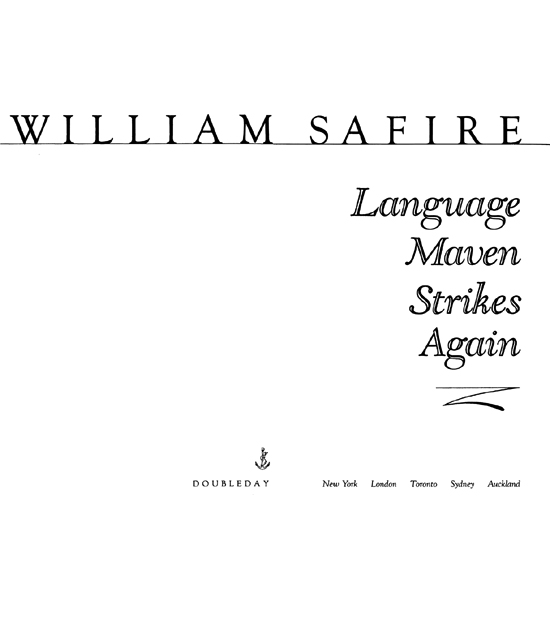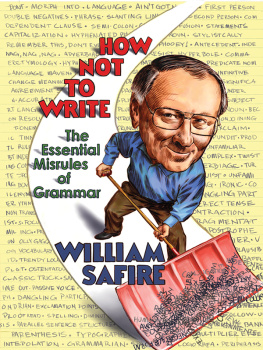Safire - Language Maven Strikes Again
Here you can read online Safire - Language Maven Strikes Again full text of the book (entire story) in english for free. Download pdf and epub, get meaning, cover and reviews about this ebook. City: New York;Amerikanisches Englisch, year: 2011;1990, publisher: Knopf Doubleday Publishing Group, genre: Home and family. Description of the work, (preface) as well as reviews are available. Best literature library LitArk.com created for fans of good reading and offers a wide selection of genres:
Romance novel
Science fiction
Adventure
Detective
Science
History
Home and family
Prose
Art
Politics
Computer
Non-fiction
Religion
Business
Children
Humor
Choose a favorite category and find really read worthwhile books. Enjoy immersion in the world of imagination, feel the emotions of the characters or learn something new for yourself, make an fascinating discovery.

- Book:Language Maven Strikes Again
- Author:
- Publisher:Knopf Doubleday Publishing Group
- Genre:
- Year:2011;1990
- City:New York;Amerikanisches Englisch
- Rating:5 / 5
- Favourites:Add to favourites
- Your mark:
- 100
- 1
- 2
- 3
- 4
- 5
Language Maven Strikes Again: summary, description and annotation
We offer to read an annotation, description, summary or preface (depends on what the author of the book "Language Maven Strikes Again" wrote himself). If you haven't found the necessary information about the book — write in the comments, we will try to find it.
Safire: author's other books
Who wrote Language Maven Strikes Again? Find out the surname, the name of the author of the book and a list of all author's works by series.
Language Maven Strikes Again — read online for free the complete book (whole text) full work
Below is the text of the book, divided by pages. System saving the place of the last page read, allows you to conveniently read the book "Language Maven Strikes Again" online for free, without having to search again every time where you left off. Put a bookmark, and you can go to the page where you finished reading at any time.
Font size:
Interval:
Bookmark:

BOOKS BY WILLIAM SAFIRE
Language
You Could Look It Up
Take My Word for It
I Stand Corrected
Whats the Good Word?
On Language
Politics
Safires Washington
Before the Fall
Safires Political Dictionary
Plunging into Politics
The Relations Explosion
Anthologies
(with Leonard Safir)
Leadership
Words of Wisdom
Good Advice
Fiction
Freedom
Full Disclosure

PUBLISHED BY DOUBLEDAY
a division of Bantam Doubleday Dell Publishing Group, Inc.
666 Fifth Avenue, New York, New York 10103
D OUBLEDAY and the portrayal of an anchor
with a dolphin are trademarks of Doubleday,
a division of Bantam Doubleday Dell
Publishing Group, Inc.
Library of Congress Cataloging-in-Publication Data
Safire, William, 1929
Language maven strikes again / William Safire. 1st ed.
p. cm.
A collection of the authors weekly columns On language from the New York Times magazine.
1. English languageUsage. 2. English languageStyle.
I. New York Times magazine. II. Title.
PE1421.S225 1990
428dc20 89-38624
eISBN: 978-0-307-80058-9
Copyright 1990 by The Cobbett Corporation
All essays originally appeared in The New York Times.
Copyright 19841988 by The New York Times Company.
All Rights Reserved
v3.1
For Magda and Edward Bleier
E ureka! cried A. M. Rosenthal, then editor of The New York Times, explaining to his colleagues that the Greek word meant Ive found it. His inspiration: Safire will do a language column.
It was OK with me (or OK by me, as they say in New York). I had written a hefty political dictionary, contributed an annual Vogue Word Watch to the Times Magazine and fiddled with words all my working life. Why not become English-Speaking World Usage Dictator? So what if I hadnt finished college, or even studied Latin? In the language dodge, I figured, a cat could look at a king. Maybe the series could be strung out for a year.
That was in 1979. I have been riding this tiger ever since and am afraid to get off. This is the sixth compilation of On Language columns and, as always, it is enlivened by the roars, hisses, applause and emendations of the Lexicographic Irregularsthe legion of language-lovers who seize upon this outlet for their frustrations (Prioritize? Ugly!) and questioning (How many words end in gry?). In the newspaper column, I dont have the space to let my readers expound; in books, however, I can let them blaze away.
This outlet for the literate led beyond usage and word games (prioritize is bureaucratic, but has as much right to live as finalize, and you dont need to know the words beyond angry and hungry) to the seamy side of semiotics: How do you address a letter in the post-Gentlemen era? Where is the graveyard of forgotten words like knickers and sink stopper? Which of the nonce words will stay with us beyond the noncethe nuts-based nerd (nah) or the whimper-based wimp?
I used to feel like a jerk when a correspondent pointed out an obvious mistake. Now Im with Mayor Fiorello La GuardiaWhen I make a mistake, he would say, its a beautand when I make a linguistic misstep, its grist for a column.
Some people, probably conspiracy theorists, think that I make mistakes deliberately, as a mail-pull. Good; let them think that. It enhances respect for authority.
A note about Authority: In these pages, you will be given The Word about The Words. Here is what I think about what is correct and constructive, what is imprecise and destructive. You may disagree, as many of my articulate and scholarly (or plain ornery) readers do. Its your language, too, buddy; if you want to abuse it and muddle it up, you will do that for yourself, not for me. If, on the other hand, you are willing to think about how we communicate, and consider the words and the forms of grammar, then you are automatically a member of the Authority, entitled to a ring and a secret handshake and the thrill of membership. A word of warning: If you get hooked on the study of the language, youre in that sorority, or fraternity, for life.
Youll be watching, as I am now, for the word that encompasses sorority and fraternity, that turns sisterhood and brotherhood into familyhood. I dont know what that word is, but not to worrysome reader will find it or coin it and send it in.
S tyle, in the literary sense, is the way we use words to express what we think or feel. Too often, grammarians and less self-conscious writers limit the meaning of the word to the rules of spelling, punctuation or usage that can be found in a style book (or, as some style books direct, stylebook); but the elements of style, to use the name of the best-selling little book on that subject, include not merely the agreed-upon conventions of the writing trade, but encompass the strength, precision, grace and honestyor lack of those virtuesthat characterize the way we communicate.
The paragraph above is not written in my style. Readers of dictums in this space have come to expect a grabber of a leada quotation with some egregious misuse of masterful for masterly and other such solecisms in vogue, or a shout of outrage from some big shot cut down to medium shotfollowed by a deluge of erudition that sugarcoats a grammatical pronunciamento or pinpricks some political orators trial balloon. These readers know that I would die before lining myself up before the memorandums of the Squad Squad with a redundancy like agreed-upon convention.
Why, then, have I reverted to the soporific kind of lead that you can read in any how-to book on writing for success, or dressing for writing, or writing and dressing to seduce impressionable young literary agents and take down megabucks? Nobody but a pedant, a professional esthete or a language-book author would begin any article or chapter with Style, in the literary sense.
Such a la-di-da ringing of the belles-lettres, haughtily presenting such unasked-for information, causes the sensible reader to demand: Why do I need to know this? Why is this man lecturing at me? and to turn the page with the knuckle-to-the-lips satisfaction of an adult videogoer fast-forwarding past the tapes opening credits to get right to the hard-core pornography.
My purpose in beginning with a let-go lead, opposite of a grabber, is to limit my readership to people who are really hung up on the subject of style, surface-variety. That means we are in no great lecture hall; were in a tight little seminar of the sort of elitists who grimly stick to dicta, encomia and memoranda despite the general preference for -ums. First comes the assignment of books for outside reading.
Publishers of language books have crowned me the Great Pooh-Bah of Plugsville because I happily blurb for books on how to write. I have been reduced to such encomiums as Even this book of pedagogic pettifoggery may help. For years, I have held that any decent book on plain writing will help the reader improve his style, because most people dont pay any attention to style at all, and, as a result, banal words and stereotypes are chosen, sentences with passive constructions mar the literary skyline and paragraphs lurch on the page without benefit of topic sentences.
Font size:
Interval:
Bookmark:
Similar books «Language Maven Strikes Again»
Look at similar books to Language Maven Strikes Again. We have selected literature similar in name and meaning in the hope of providing readers with more options to find new, interesting, not yet read works.
Discussion, reviews of the book Language Maven Strikes Again and just readers' own opinions. Leave your comments, write what you think about the work, its meaning or the main characters. Specify what exactly you liked and what you didn't like, and why you think so.






